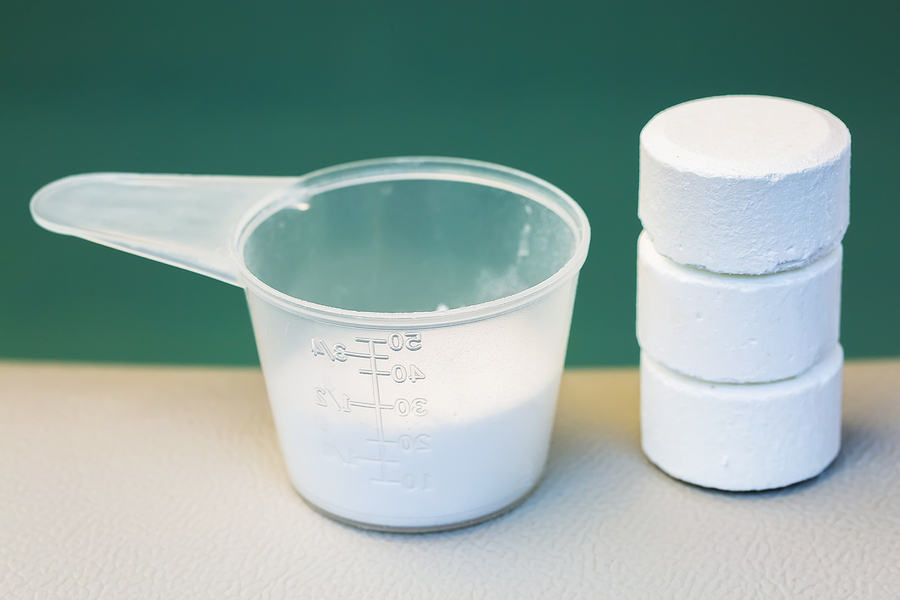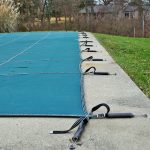Comparing The Many Forms of Swimming Pool Chlorine
Did you know that swimming pool chlorine comes in many different forms? Depending on its chemical composition, chlorine can be a gas, liquid, or a solid! However, the overall function remains the same: to sanitize your swimming pool. With that said, let’s review what makes each type of chlorine product unique.
Chlorine Gas
Be careful: chlorine gas is a very toxic substance! That makes it a very effective disinfectant. However, human contact with this swimming pool chlorine form can irritate the lungs and skin. This is why chlorine gas is usually sold as a compressed liquid.
Liquid chlorine is heavier than water. In other words, it will return to its gas state once released from its container. In addition, chlorine in this form is quite cost-effective. Pool maintenance professionals may use it to raise free chlorine levels (chlorinated water that has not interacted with any contaminants).
Regarding residential use, chlorine gas should be avoided due to the dangers of handling it incorrectly. In fact, it has been banned in many places as a result of its high toxicity levels. For this reason, there are training requirements in place as well as rising insurance premiums and maintenance costs. Be sure to consult a trained CPO if chlorine gas is absolutely necessary for your swimming pool.
Sodium Hypochlorite (Liquid Bleach)
When chlorine gas is dissolved into a sodium hydroxide solution, liquid bleach is born. This form of swimming pool chlorine is unstabilized, clear in color, and chemically corrosive. When chlorine is unstabilized, that means it has no cyanuric acid added to it which makes it dissipate more quickly. Therefore, it must be stored in cool, dark, and dry places. However, it can’t be stored for more than a month at a time due to its natural decomposition.
Sodium hypochlorite is commonly used by pool professionals because of its low cost. It can be bought in bulk which makes it ideal for sanitizing large commercial pools. If you’re thinking about using it for residential purposes, you may want to reconsider.
Liquid bleach has a pH value of 13 or higher. This means that you will need to add muriatic acid (or pH decreaser or CO2) to balance it out. Also, liquid bleach can be corrosive to pool surfaces if used haphazardly. Make sure you’re using personal protective equipment when handling it or any other chemical.
Calcium Hypochlorite
Perhaps the most popular powder form of swimming pool chlorine, calcium hypochlorite is often used as shock treatment. Shocking a pool means raising the chlorine level to 10ppm. Although any type of chlorine can do it, calcium hypochlorite is often used thanks to its high chlorine concentration and cost-effectiveness.
It’s worth considering the fact that calcium hypochlorite will raise the calcium hardness level of your pool or the measure of dissolved calcium and magnesium in the water. If your calcium hardness level remains too high, it could cause corrosion to your pool surface. In addition, calcium hypochlorite has a high pH, so you may need to add acid in a similar fashion to sodium hypochlorite.
If you’re looking to pick up this helpful swimming pool chlorine product, it is often sold in 5lb bags of powder or tabs. In these solid forms, chlorine feeders or chlorinators must be used to gradually sanitize the water. Make sure to regularly maintain your feeder as calcium and organic waste can build up fast.
Honorable Mentions
There are countless swimming sanitizer forms to choose from, all ranging in cost and function. For example, if you’re looking for a powder sanitizer that is comparable to calcium hypochlorite, sodium dichlor may be best for you. It is a stable chlorine, meaning it can be used as both a sanitizer and a shock.
On the other hand, if you’re searching for a sanitizer with a low pH that can be placed in a chemical feeder, chlorine tablets (trichlor) would be ideal. They are very commonly used thanks to their time and money-saving qualities.
Still Unsure Which Form of Swimming Pool Chlorine is Best?
Our team at Pool Operation Management will clear things up. We will happily help you choose the right products you need for your swimming pool. Whether you need chlorine for residential or commercial use, our experts are trained and ready to serve you. Give us a call today to learn more.







